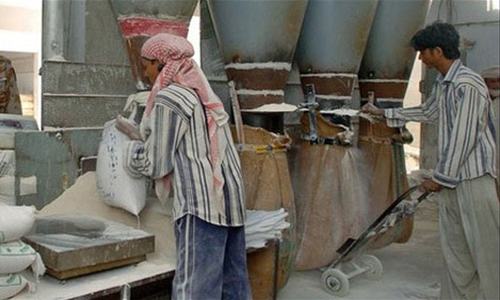THE so-called wheat import scam has taken a new turn, as the government-appointed investigating committee has begun interviewing officials to identify those responsible for authorising wheat imports over the anticipated shortages.
The hue and cry over the issue is more ‘political’ than economic, indicating that the federal government needs strategies to manage the country’s expected wheat surplus. In any case, Punjab farmers are affected by the agricultural department’s ineffective governance structure.
Wheat imports necessitate a thorough inquiry, beginning with those who generate estimates of potential wheat shortages in the country and ending with those who issue wheat import permits. The committee should also investigate whether the minimum support price of Rs4,000 per 40 kg at the sowing stage was determined properly or arbitrarily on someone’s instructions.
The import of 3.612 million tonnes of wheat in FY24 may be a minor concern, but the main issue is to improve the reporting mechanisms for wheat production and consumption in provincial agriculture departments and the Federal Ministry of Food Security. Many analysts argued that the government was diverting people’s attention away from the underlying issue by forming committees to investigate private-sector-led imports that received no government subsidies.
Wheat imports meet government permission, according to the first fact-finding committee. Still, the government removed the Ministry of Food Security secretary and the Plant Protection Department director general before the investigative committee report to show Punjab farmers that the federal government cares. On Saturday, Prime Minister Shehbaz Sharif held a meeting in Lahore to consider the issue and form a new committee while his elder brother Nawaz Sharif requested a National Accountability Bureau inquiry.
The question is: why are farmers in Punjab protesting alone? Wheat imports are not confined to Punjab; private firms in Karachi also imported the wheat. There are two interpretations: Sindh harvesting was completed before March, and the provincial government fulfilled its commitment to purchase wheat from farmers at the agreed-upon price of Rs4,000 per 40kg. Then it begs whether the wheat issue is being addressed appropriately in Punjab.
The number one wheat importer is Trading Louis Dreyfus, a French commodities and grain company with an office in Karachi and an eight-day shipping time. This company bought 849,448 tonnes of wheat, accounting for 24pc of total wheat imports. United Resources Corporations is the second largest importer, accounting for 520,442 tonnes and 15pc of total private sector imports in FY24. There are 65 total wheat importers, 17 of which are flour mills that also import wheat. The plant protection agency is estimated to have issued approximately 1,000 permits to these importers.
Former Caretaker Prime Minister Anwaar ul Haq Kakar told Dawn that he knows about the wheat import issue based on Food Security Ministry projections. He said his government valued private sector wheat imports. He denied corruption, saying the private sector imported wheat due to falling international prices. The opposition party PTI has accused the caretaker government of corruption for allowing wheat imports, which they have not supported with any evidence.
In a summary to the ECC on Sept 27, 2023, the Ministry of Food Security requested 1 million tonnes of wheat as strategic supplies for 2023-24. The ministry was informed that the finance division backed private wheat imports rather than Pakistan Trading Corporation purchases. The summary predicted a 2.45 million-tonne wheat shortage in 2023-24. Even if these data are genuine, why was an excess of 1.162m tonnes of wheat imported in FY24, resulting in a loss of foreign exchange for the government?
The question is how this estimate was done to predict the shortfall in wheat production. The inquiry committee must investigate how the wheat shortage was calculated. What was the strategy, and were provincial government inputs property acquired? This will begin the process of finding projection and consumption reporting issues. The agriculture department relies on Patwari statistics, which are assumptions rather than real-time facts.
The Food Security Ministry secretary should have taken more measures while submitting a wheat import report to the ECC. The situation showed that the secretary should not rely simply on subordinate projections and should calculate them appropriately.
The Department of Plant Protection, which issues wheat import permits, must investigate why too many were approved. The committee should investigate permit issuance oversight for corruption. The FIA is investigating in the department, which may affect operations and imports of other vital commodities. Cotton import permits from the department are being cited by the textile association for delays. Instead of removing department heads, department need real-time restructuring to improve operations.
There should be no media trial of private sector importers who purchased wheat from the international market in the hopes of receiving higher prices as promised by the government at the time of sowing. However, it did not occur as prices fell in the open market. So, the private sector is on the losing end. Furthermore, there are millions of unregistered Afghans in Pakistan who did not contribute to consumption figures.
As a result, more imports may not result in lower wheat prices further. Many experts believe that the Sindh government arbitrarily hiked the minimum support price to Rs4000 per 40kg without following the proper procedure, leaving Punjab with no choice but to follow the Sindh government’s decision. It is estimated that the realistic price is between Rs3200 and Rs3300 per 40 kg.
Instead of wasting time demoralising our farmers or the business sector, the federal and Punjab governments should give funding to acquire wheat from farmers as promised. In the event of a real-time bumper crop, Pakistan might later export wheat in the range of 2 million to 4 million tonnes, depending on the surplus, particularly to Afghanistan.
Published in Dawn, May 5th, 2024












































Dear visitor, the comments section is undergoing an overhaul and will return soon.